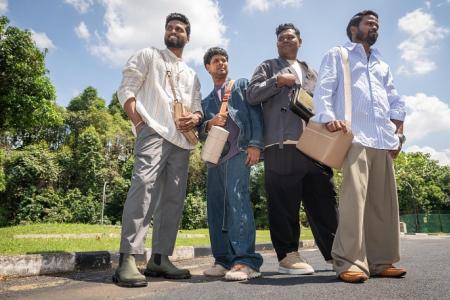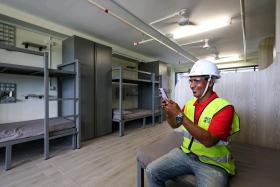Free makeover by local fashion labels turns migrant workers into models
On a typical workday, Mr Madhurajan Prakash wears his company’s T-shirt and a simple pair of trousers as he checks electrical containment installations.
The electrical supervisor traded that attire on Oct 27 for a lightweight striped shirt and grey trousers, olive leather boots and a taupe bag slung around his shoulders.
Mr Prakash, 27, a 1.8m-tall Indian national, then posed gamely under the blistering sun as photographers snapped away.
He is one of 10 migrant workers who joined a photo shoot at Sembawang Recreation Centre, organised by ItsRainingRaincoats (IRR), a charity for migrant workers’ welfare.
IRR said it thought of this project to get Singaporeans to see migrant workers as unique individuals and not just as groups of foreign workers who work at construction sites or industrial estates.
The Indian and Bangladeshi men got a free makeover with professional make-up, hairstyling and a wardrobe change before striking poses like the models in men’s magazines.
Mr Prakash said the makeover reminded him of how his parents bought him new clothes every Deepavali.
He has never bought new apparel in Singapore in his three years here, as he finds it too expensive.
He is not celebrating the festival with his family in 2024 because of work. “(This makeover) is a Deepavali gift,” he said.
IRR founder Dipa Swaminathan said many people typically stereotype migrant workers as one anonymous group when they are all clad in the same attire.
“The whole idea of this project was to showcase them as individuals,” she said, adding that she hopes migrant workers can become brand ambassadors for fashion labels.
“Imagine if migrant workers see one of them featured in an ad in Singapore. Just that morale boost is priceless, that one of them could be accepted in the community in this way,” Ms Dipa said.
The IRR team took two months to contact over 60 fashion and shoe brands for sponsorship. Six brands responded with interest.
Eventually, IRR worked with two of them – local clothing label Graye; and footwear, bags and accessories brand PEDRO, which is part of home-grown fashion giant Charles and Keith.
A PEDRO spokesman said the brand joined the photo shoot as it believes in inclusivity.
He said migrant workers are an overlooked community, adding: “For us to be able to bring some spotlight on them to showcase who they are, it’s definitely something that we want to do.”
Graye’s co-founders, married couple Calvin Sim and Xie Qianqian, both 31, said they were glad to be involved in the project.
Ms Xie said: “Fashion is a medium for you to express yourself. Why not let migrant workers express themselves as well? Fashion should be accessible to everyone.”
IRR found the 10 men through its existing community and social media.
Construction worker Chandra Sekar, 32, was encouraged by his mother to give modelling a shot.
The Indian national, who came to Singapore 13 years ago, said: “My mother said, ‘You work so hard in Singapore, you can try something different’.”
The men sent photos of themselves to the brands, which selected their outfits according to their personal style.
The brands sponsored 10 sets of clothes, bags and shoes. Each item typically costs over $100.
Mr Sekar, who shops for clothes in Little India twice a year, has never bought apparel costing more than $30.
Bangladeshi construction worker Siddha Chiranjit, 29, gushed over his matching denim outerwear and jeans.
Mr Chiranjit, who posts dance covers on TikTok, said: “This is like dancing hip-hop. This is my style.”
Fellow Bangladeshi Sarker Md Alamin, 34, a material controller at an oil and gas firm, said he had always wanted to go into acting or advertising, but put that dream aside to work here.
His usual work attire is a blue work suit with a yellow hard hat and black safety boots, which makes him indistinguishable from his colleagues.
After posing for photos in a chic grey jacket, he said with a grin: “Now, becoming a star. Everyone knows Sarker.”
The workers got to keep the shoes and bags as a gift.
They returned the clothes to Graye, but the brand donated about 60 T-shirts to IRR to distribute to migrant workers.
The photos will be shared by IRR and the fashion brands’ social media pages.
But the workers are not after the publicity.
Mr Sarker, who got married in 2023, said: “I will send the photos to my wife. She’s waiting to see how I look.”
Get The New Paper on your phone with the free TNP app. Download from the Apple App Store or Google Play Store now


